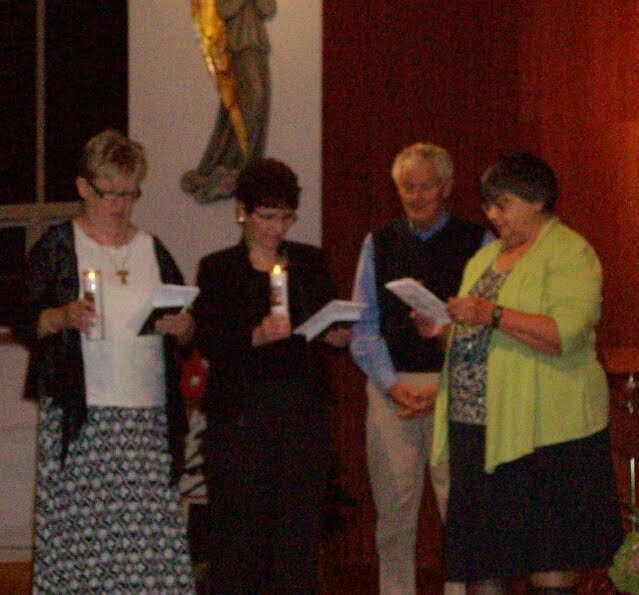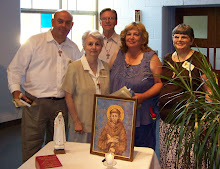The 2021-24 Council following elections November 14 (from left) Rich Backlas, Spiritual
Assistant; Mary Smith, Treasurer; Marilyn Gawlik, Secretary; Nancy Strong, Vice
Minister; Lee Strong, Minister, Betty Carmen, Formation Director.
Thursday, November 18, 2021
New Fraternity Council
Monday, October 18, 2021
Personal Charitable Action
Personal Active Charity
Mother Teresa once commented, “Love is not patronizing and charity isn’t about pity, it is about love. Charity and love are the same — with charity you give love, so don’t just give money but reach out your hand instead.”
As Franciscans, we are called to give more than money and donations. We are called to reach out with our hands, to take a personal active role as best we can.
St. Francis himself was not afraid to make his charity personal. Thomas of Celano noted in his first life of Francis that our Seraphic Father did more than kiss a leper once.
“And then the holy lover of all humility betook him to the lepers, and was with them, serving them all most zealously for God's sake, washing all foulness from them and even wiping away the matter from the ulcers; even as he says himself in his Testament, ‘For when I was in sin it seemed to me exceeding bitter to look on lepers, but the Lord brought me among them, and I showed mercy unto them.’”
Thus we each need to find ways – based on our particular circumstances – in which we can go beyond donating money and goods, and undertake direct, active works of charity as individuals and as a Fraternity.
Sunday, October 3, 2021
Assisi Sunset
Assisi sunset -
an exaltation of larks
welcome Francis home
(St. Francis died at sunset on October 3. Witnesses say that a flock - an exaltation - of larks gathered where he was dying and sang, even though larks are normally not about at that time of day. One of the most famous stories about him is his preaching to the birds.)
Thursday, June 24, 2021
Saintly Secular Franciscan Fathers
In light of today being Father’s Day, we honor all Secular Franciscans over the centuries who have been fathers. Some of those Secular Franciscan fathers have also been recognized by the Catholic Church as Saints and Blesseds. Among those are Saint. Ferdinand III of Castile, Saint Thomas More (whose feast day is this Tuesday). Saint Louis IX (a Patron of the Secular Franciscan Order), and Saint Louis Martin (the father of Saint Therese of Lisieux).
Ferdinand and his first wife Beatrice had 10 children. When she died, he married again and he and his second wife Jane had three children. As a king, he was a great administrator and a man of deep faith, with a strong devotion to Mary. He founded hospitals, and bishoprics, monasteries, churches and cathedrals during his reign. Her also compiled and reformed a code of laws which were used until the modern era. Ferdinand fought to free parts of Spain from the Moors, and rebuilt the Cathedral of Burgos and changed the mosque in Seville into a Cathedral. He was a just ruler, frequently pardoning former offenders to his throne.
More is famous for his support of the Catholic Church and his refusal to accept Henry VIII’s break with the Church – for which More was later executed, becoming a martyr.
But long before his death, he was a man of deep faith. Early in life he considered a religious vocation, but chose instead to marry and become a Secular Franciscan. He and his first wife had four children, and family life included daily prayer, and, unusual for the time, education for his daughters.
While imprisoned shortly before his death, More wrote a letter to his daughter Margaret, concluding it with, “And, therefore, my own good daughter, do not let your mind be troubled over anything that shall happen to me in this world. Nothing can come but what God wills. And I am very sure that whatever that be, however bad it may seem, it shall indeed be the best.”
King Louis IX is a Patron of the Secular Franciscan Order. He and his wife Margaret had 11 children. He reformed the legal system in France, and was a leader in two Crusades, the Seventh and the Eighth, dying of disease during the latter.
King Louis was noted for his holiness, He was also known for his charity. Beggars were fed from his table, he ate their leavings, washed their feet, ministered to the wants of the lepers, and daily fed over one hundred poor. He founded many hospitals, a home for reformed prostitutes; a home for blind men, and supported the construction of a number of churches.
In a famous letter he reportedly wrote to his son, the future King Philip III, he said “…the first thing I advise is that you fix your whole heart upon God, and love Him with all your strength, for without this no one can be saved or be of any worth.
You should, with all your strength, shun everything which you believe to be displeasing to Him. And you ought especially to be resolved not to commit mortal sin, no matter what may happen and should permit all your limbs to be hewn off, and suffer every manner of torment, rather than fall knowingly into mortal sin.
If our Lord send you any adversity, whether illness or other in good patience, and thank Him for it, thing, you should receive it in good patience and be thankful for it, for you ought to believe that He will cause everything to turn out for your good; …”
Louis Martin and his wife and fellow saint Zelie Martin had nine children, five of whom lived to adulthood and became women religious – including Saint Therese of Lisieux.
Both Louis and Zelie were drawn to religious life, but were frustrated in their attempts, and instead met and married. The two Secular Franciscans created a family life rooted in faith – as evidence by their daughters all entering religious life. They never worked on Sunday. They carried out various works of mercy, and were generous with time and money towards the poor in the community. They always prayed for the souls of those who had died, and went out of their way to help dying people receive the Sacrament of Anointing of the Sick and Last Rites. They followed the Church’s guidelines of fasting and abstinence, supplementing them with further voluntary mortifications. As a couple, they attended 5:30 a.m. daily Mass. Saint Louis was very devoted to making pilgrimages and participating in all-night vigils in reparation for the loss of the Catholic faith in France at his time.
Saints Ferdinand, Thomas, King Louis, Louis Martin, and all Secular Franciscan father saints, pray for us.
Tuesday, June 1, 2021
Two Encyclicals With Franciscan Ties
May 29th was the feast day of Pope St. Paul VI, a Secular Franciscan.
There were many reasons why he was recognized as a Saint, but he is perhaps best remembered for his prophetic encyclical, Humane Vitae. The encyclical has been attacked (especially by people who never read it) and is often described as just a reiteration of the Church’s teachings against artificial methods of birth control. But the encyclical did more than prohibit. It is a wonderful exploration of marital love. And it warned about potential negative results of using birth control. In it, the Pope predicted such use could result in:
“Marital
infidelity and a general lowering of moral standards.”
[Men] may forget the reverence due to a woman, and, disregarding her physical and emotional equilibrium, reduce her to being a mere instrument for the satisfaction of his own desires.”
“The danger of this power passing into the hands of those public authorities who care little for the precepts of the moral law…. Who will prevent public authorities from favoring those contraceptive methods which they consider more effective? Should they regard this as necessary, they may even impose their use on everyone.”
Sadly, we have witnessed the accuracy of those predictions
Humane Vitae is well worth reading or rereading. You can find a copy of it online here - https://www.papalencyclicals.net/Paul06/p6humana.htm
Another
papal encyclical has been in the news recently.
The Vatican has unveiled a 7-year “action platform” to generate
environmental action, as suggested by Pope Francis’s 2015 encyclical Laudato
Si’.
In a statement welcoming
the Laudato Si’ Action Platform (LSAP), Pope Francis said that the earth “that
hosts us suffers as a result of wounds that we cause by our predatory
attitude.”
The encyclical makes wide use of Franciscan ideas, and cites St.
Francis and St. Bonaventure frequently. It has often been unfairly
misrepresented – as happened with Humane
Vitae – but it too is well worth reading (especially before commenting on
it!).
The text of it can be found online at https://www.vatican.va/content/francesco/en/encyclicals/documents/papa-francesco_20150524_enciclica-laudato-
Pax et bonum
Sunday, March 21, 2021
The Patron Saint of Ecology
It’s Spring.
A season of new life, and of appreciation of the beauty
of nature.
St. Francis of Assisi, of course appreciated nature in a
far more profound way than he is often stereotyped with bird baths and lawn
ornaments. He is called the patron saint of the environment and ecology.
Pope St.
John Paul II, on November 29, 1979, recognized this connection when he issued a papal bull declaring St.
Francis i the patron of ecology and of those who promote ecology.
The Pope
wrote: "Among the holy and admirable men who have revered nature as a
wonderful gift of God to the human race, St Francis of Assisi deserves special
consideration. or he, in a special way, deeply
sensed the universal works of the Creator and, filled with a certain divine
spirit, sang that very beautiful ‘Canticle of the Creatures’"
In that
Canticle – also called “The Canticle of Creation,” St. Francis wrote,
“Be praised, my Lord,
for Sister Earth, our Mother,
who nourishes us and sustains us,
bringing forth fruits and vegetables
of many kinds
and flowers of many colors.”
~ From “The Canticle of Creation”
Following
the publication of Pope Francis’s Laudato Si': On Care for Our Common Home, the
U.S. Conference of Catholic Bishops created a prayer based on the encyclical:
Prayer
to Care for Our Common Home
Father
of all,
Creator
and ruler of the universe,
You
entrusted your world to us as a gift.
Help
us to care for it and all people,
that
we may live in right relationship—
with You,
with ourselves,
with one another,
and with creation.
Christ
our Lord, both divine and human,
You
lived among us and died for our sins.
Help
us to imitate your love for the human family
by
recognizing that we are all connected
—
to our brothers and sisters around the world,
to those in poverty impacted by
environmental devastation,
and to future generations.
Holy
Spirit, giver of wisdom and love,
You
breathe life in us and guide us.
Help
us to live according to your vision,
stirring
to action the hearts of all—
individuals and families, communities of
faith,
and civil and political leaders.
Triune
God, help us to hear the cry of those in poverty, and the cry of the earth, so
that we may together care for our common home. Amen.
So
what do we do?
The
National Justice, Peace and integrity of Creation
Office has one suggested step.
A Call to Action
Single-use
plastics, often also referred to as disposable plastics, are commonly used for
plastic packaging and include items intended to be used only once before they
are thrown away or recycled. These include, among other items, grocery bags,
food packaging, bottles, straws, containers, k-cups, cups and cutlery. Think
about your experience and use of single-use plastics.
Pick
just one plastic item: straws, grocery bags, bottles, or cutlery. Replace this
item with a more eco-friendly replacement, like having reusable bags with you
when you grocery shop. Or, keep a set of metal or bamboo cutlery wrapped in a
reusable cloth napkin with you when you go to eat. How about using paper, metal
or silicon straws instead of wasting the plastic ones? Just replace one item at
a time and see how it feels. It may not seem like much, but in the long run, it
will end up making a big difference.




